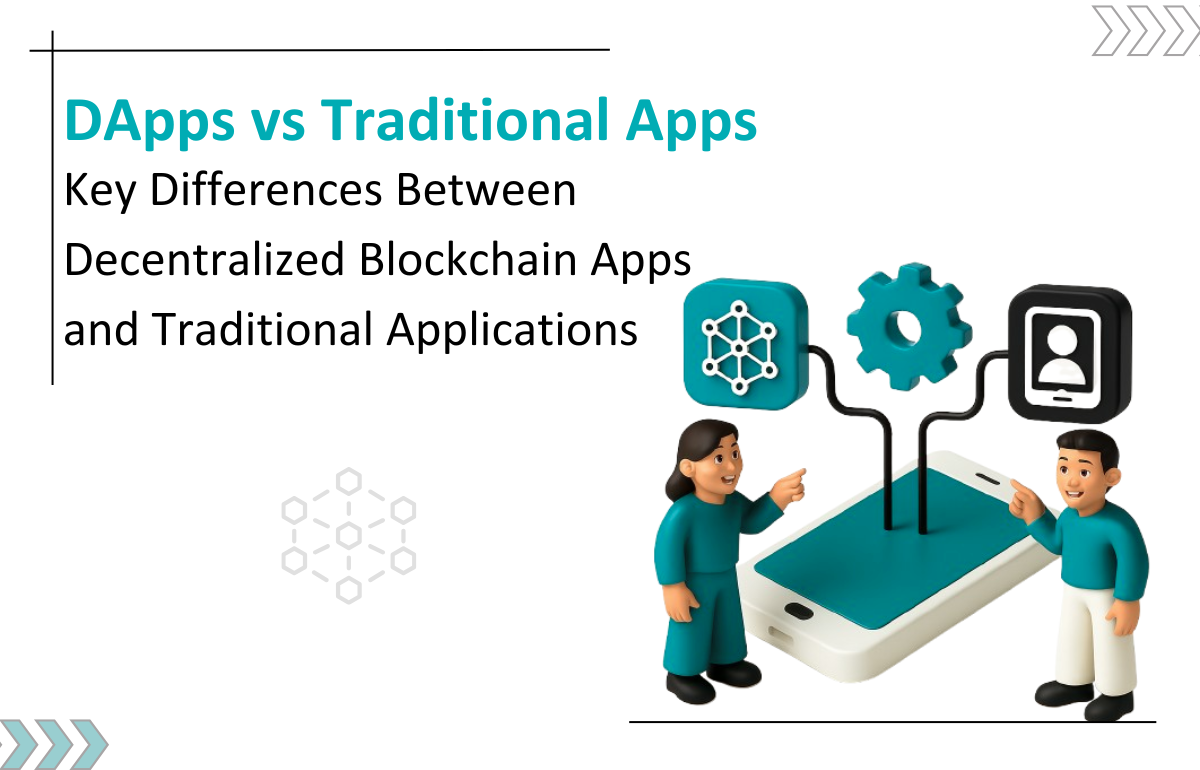
The world is steadily moving towards more advanced technologies, that don’t just only benefit humanity, but also revolutionize society. With the newest iteration of the internet, Web 3.0 based on blockchain technology, the world is adopting the decentralized format.
In this blog, we will understand decentralized applications, referred to as DApps, with their key benefits and use cases.
DApps are ideally just like standard applications that we use in our day-to-day lives. They function just like our traditional applications, there isn't even a noticeable difference.
However, what makes them different from traditional applications is that they're built using blockchain technology with smart contracts. Blockchain-based DApps offer much more to the users in terms of ownership, security, and feature set than a traditional application.
As the name suggests, decentralized apps are decentralized in nature, meaning that a single entity or an authority does not have control over it. It is essentially "By the people, for the people".
If you are also curious about decentralization in organizations, you might want to check out our blog on What are DAOs and How They Differ from Traditional Organizations to understand how decentralized autonomous organizations operate compared to traditional businesses.
While it is evident, that DApps are similar to our traditional apps, let us now look at a few of the distinct advantages they offer, which make them a reliable choice for the future.
DApps are built on the backbone of blockchain technology with the help of smart contracts, making them immutable and therefore more secure. Blockchain enables decentralization, so a single entity doesn’t have control over it.
Since the DApps are decentralized in nature, the government or a single authority does not have control over it. This eliminates the possibility of content censorship or control over it.
DApps are Peer-to-peer network based, this ideally means that they do not have a single hosting server, which in turn ensures no network failures, and therefore no downtime.
With the assistance of smart contracts, cryptocurrencies can also be integrated into the DApps, which would aid transactions. So it ideally eliminates the need for fiat currency.
DApps are part of the newest iteration of the internet i.e. Web 3.0. They are based on blockchain, powered by smart contracts for logical rigidity.
They run on peer-to-peer networks, which essentially means that a single entity doesn’t have control over it. This model promotes their decentralized format.
One of the prime reasons why DApps are highly reliable compared to traditional apps is that smart contracts are hard to alter. Once a smart contract is deployed on the blockchain, it cannot be changed.
As the world is progressing towards a more decentralized format with the growth of blockchain technology, it is important to investigate potential use cases of DApps.
Decentralized finance as an industry is growing at an enormous pace because of the advantages it offers to people. Traditional finance has always been centralized in nature with a central authority or entity having control over your assets. With the growth of DApps, Decentralized-Finance (DeFi) can be promoted by eliminating the need for a central authority in the domains of financial services.
The major problem that blockchain solves is the issue of ownership of assets. Traditional games never allowed players to own their in-game assets and purchases. They were always owned by the developer of the game. With the development of DApps, players get a chance to have complete control over their in-game assets. In this flow, NFTs fuel it by giving players a certificate of ownership of their digital assets.
Understanding the key differences between traditional apps and DApps will give an idea as to why DApps have an edge over traditional apps!
| Traditional Applications (Apps) | Decentralized applications (DApps) |
| Centralized in nature, meaning they are owned and operated by a specific entity | Decentralized in nature, meaning a single entity does not have control over it |
| Based on the Web 2.0 version of the internet | Based on the Web 3.0 version of the internet i.e. the blockchain |
| Less privacy as the user has to provide details about their identity in most cases to access apps | Increased privacy with no need to give away personal information |
| Usually do not run in an open-source environment | DApps run in an open-source environment |
With the development of Web 3.0, people are moving towards a decentralized world. Traditional applications have a few shortcomings, that are solved with the help of blockchain technology.
Decentralized applications (DApps) are the future of the application industry. They’re safe, and reliable and give their users complete ownership.
We, at Seaflux, are Blockchain enthusiasts who are helping enterprises worldwide. Have a query or want to discuss Blockchain projects? Schedule a meeting with us here, we'll be happy to talk to you.

Director of Engineering